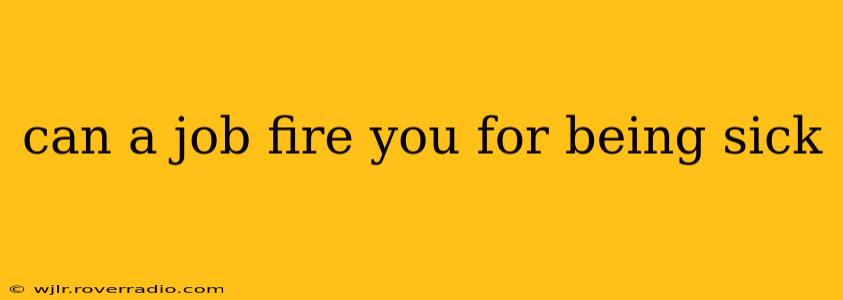Can a Job Fire You for Being Sick? Navigating Illness and Employment
Getting sick is an unavoidable part of life, but the question of whether your employer can fire you for it is complex. The answer, unfortunately, isn't a simple yes or no. It hinges on several factors, including your location, the type of employment you have (at-will or contract), the severity and duration of your illness, and your company's policies. Let's delve deeper into this crucial aspect of workplace rights.
What is an "At-Will" Employment?
Many U.S. states operate under an "at-will" employment system. This means an employer can generally terminate an employee for any legal reason, or no reason at all, without warning. However, even in at-will employment states, firing someone solely for being sick can be legally problematic under certain circumstances, particularly if it violates anti-discrimination laws or breaks specific contractual agreements.
Can an Employer Fire You for Taking Sick Leave?
This depends heavily on the specifics of your situation. Generally, employers cannot fire you for taking legally protected sick leave. The Family and Medical Leave Act (FMLA) in the United States, for instance, protects eligible employees from job loss when they take leave for serious health conditions or to care for a family member. However, FMLA only applies to specific employers and employees who meet certain eligibility requirements (typically, those working for a covered employer for at least 12 months, with 1250 hours of service).
Similarly, many states have their own sick leave laws offering protection. These laws often mandate paid or unpaid sick leave for various reasons, including illness, injury, or family emergencies. Violation of these laws can lead to legal repercussions for employers.
What if My Illness is Long-Term or Recurring?
Long-term or recurring illnesses present a more nuanced situation. While an employer cannot fire you simply for having a chronic condition, they might have grounds for termination if your absences significantly impact your job performance or the business's operations. This often necessitates a documented performance improvement plan (PIP) to address the issues and give you an opportunity to improve. Firing for excessive absences related to a long-term illness requires careful consideration to avoid legal challenges, often involving discussions with HR and potentially legal counsel.
What if I Don't Have a Doctor's Note?
While a doctor's note isn't always legally required for short-term absences, it's always beneficial to provide one, especially for longer periods. This documentation protects you and provides evidence of your illness. Your employer's policies will clarify their requirements regarding documentation for sick leave.
How Can I Protect Myself?
- Know your rights: Familiarize yourself with your state's labor laws and your employer's policies regarding sick leave and absences.
- Communicate proactively: Inform your employer of your illness as soon as possible and keep them updated on your progress.
- Document everything: Keep records of your doctor's visits, medical notes, and any communication with your employer regarding your illness.
- Seek legal advice if necessary: If you believe you've been unfairly terminated due to illness, consult with an employment lawyer.
Frequently Asked Questions (FAQs)
Can I be fired for calling in sick frequently? Excessive absences can be grounds for termination, but only after proper procedures have been followed, such as a PIP and clear documentation of the impact on work. The frequency considered "excessive" will vary based on your employer's policies and your specific role.
What if my employer suspects I'm faking my illness? Employers need substantial evidence to suspect fraud. If your employer has concerns, they should discuss this with you and perhaps request medical verification. Arbitrary suspicion is not sufficient grounds for termination.
Can I be fired for a mental health condition? In many places, discrimination against employees with mental health conditions is illegal. Employers must provide reasonable accommodations as required by law. Firing someone solely for a mental health condition is usually unlawful.
What are the consequences for an employer who fires someone illegally for being sick? Illegal termination can result in lawsuits, hefty fines, back pay for the employee, and damage to the employer's reputation.
Ultimately, the legality of firing someone for being sick depends on many factors and requires a careful review of all relevant circumstances. Knowing your rights and documenting everything will significantly improve your chances of protection should a situation arise.
